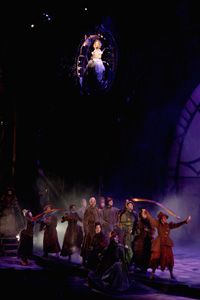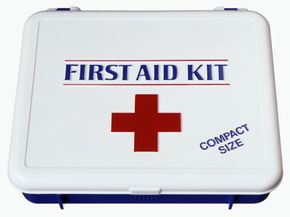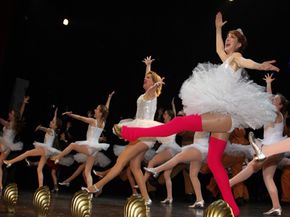A stage manager is invisible to the audience unless something goes wrong. But stage managers are highly visible to the cast and crew they coordinate during rehearsals and performances. A stage manager is also essential to the director in making sure that his vision is carried out in the actual play.
Stage management takes in a lot of different tasks, so most productions have more than one stage manager that work as a team. Most plays require at least two, and Broadway shows need at least three, according to Ira Mont, who was stage manager on Broadway for "Young Frankenstein." Some of the titles are:
Production stage manager -- The head stage manager, in charge of making sure the production goes smoothly and the supervisor of the other stage managers. This title is used mostly for Broadway plays. In other productions, the head stage manager is usually just called the stage manager.
Stage manager -- On Broadway, the second in command after the production stage manager; elsewhere, the boss.
Assistant stage manager -- Members of the stage management team who may have specific responsibilities for some aspect of production, such as crew, or serve as overall assistants, doing what the stage manager assigns.
[source: Playbill]
Let's focus on the head stage manager. A stage manager's job starts before rehearsals. He's one of the last people out of the theater after that final show and then often supervises as the stage is struck. Here's a closer look at the stage manager job summary.
- Schedules and runs rehearsals, make sure they run smoothly and on time
- Communicates what the director wants to set designers, costume staff and stage crew
- Coordinates the stage crew's work
- Calls cues for crew and possibly actor entrances during performances
- Oversees the show at each performance
During rehearsals, the stage manager works with the director to record blocking, light, sound and set change cues in the prompt book, a master copy of the script used to run technical rehearsals and the actual performances. The stage manager also works with the technical designer in creating sets that match the director's needs and then finding the most efficient way for crew to change the sets quickly during the performance.
During performances, the stage manager "runs the book," which means he uses the prompt book to cue lights, sound and set changes. The stage manager also takes notes each night on aspects of the performance to distribute to actors and production departments. But there's more than just that. The stage manager needs to deal with safety issues and crises such as a last-minute replacement for a sick actor, a wardrobe malfunction or a missing prop.
The stage manager issues the call of "Places, everyone!" before the play starts and receives emergency messages for the cast and crew during performances. He also may rehearse understudies or hold extra rehearsals for dance numbers or specific scenes of the show between performances [sources: American Association of Community Theatre and Stage Manager's Association].
A stage manager's kit is essential to doing the job well. Go to the next page to find out what's inside the kit.



